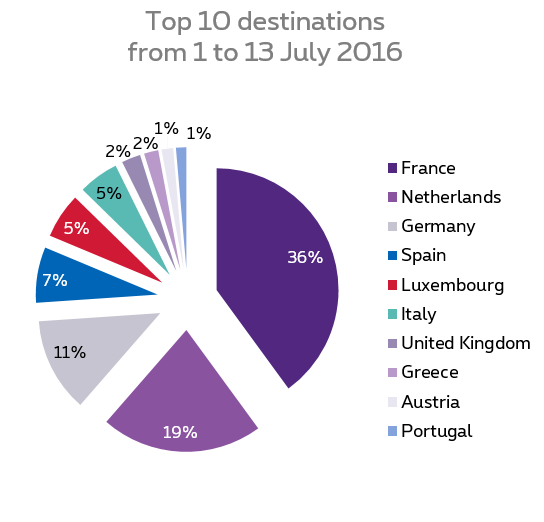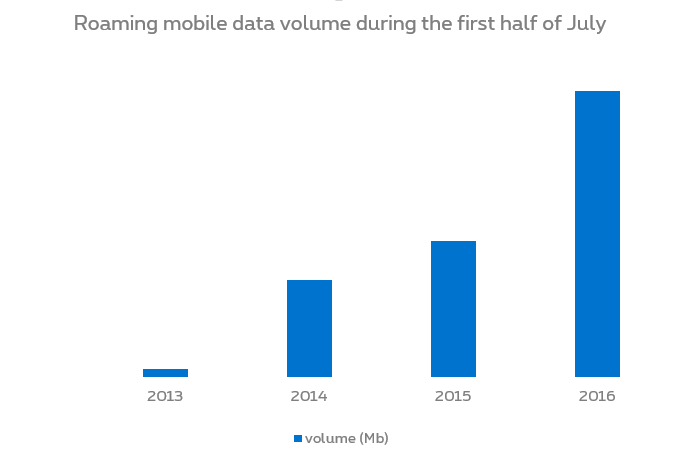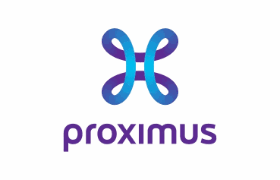Roaming prices have fallen sharply since April. But what about the use of smartphones abroad?
On the eve of one of the main holiday departure weekends, Proximus takes stock of mobile telephone usage abroad through a study conducted among its customers and an analysis of aggregated data from its network.
Consumers are more connected than ever, wanting to access and share their content anywhere, anytime and on any device. Following the change in the European roaming regulation, prices within the EU have fallen considerably. A study conducted by Proximus among its customers at the beginning of July 2016 shows that one in two customers know that the rates for calling, texting and using mobile data in the EU have fallen sharply.
In fact, once abroad, they have nothing to worry about! Belgians, who will mainly travel within the EU this summer, can stay connected everywhere, at all times, and share their best holiday moments with their loved ones! For the average price of an ice cream (€2), within the EU, most Proximus subscribers can send more than 80 texts, call for over 30 minutes, or download more than 30 photos of 1 MB on their Facebook profile, without any special option.
It is confirmed that Belgians travel mainly within Europe!
Based on the data from its mobile network, Proximus notes that, outside the school holiday period, an average of 10% of its mobile customers are abroad daily. These are mainly people traveling on business, people with a second home, and those spending (long) weekends abroad.
 During the first 15 days of July, the average number of Proximus customers who used foreign networks daily practically doubled compared with the winter months. Of those travelling, 92% were in Europe. The most popular destination is by far France, where 36% of Proximus customers can currently be found, followed by the Netherlands (19%) and Germany (11%). Spain and Italy each account for 7% and 5% of customers respectively, but with the peak season approaching, we expect this data to change in the coming weeks.
During the first 15 days of July, the average number of Proximus customers who used foreign networks daily practically doubled compared with the winter months. Of those travelling, 92% were in Europe. The most popular destination is by far France, where 36% of Proximus customers can currently be found, followed by the Netherlands (19%) and Germany (11%). Spain and Italy each account for 7% and 5% of customers respectively, but with the peak season approaching, we expect this data to change in the coming weeks.
Consequently, although it is still too early to draw any conclusions, the data from Proximus seems to confirm the figures of the Holiday Barometer 2016 of Europ Assistance published in the spring, which indicate that for Belgians "France continues to be the top destination (27%), followed bySpain (17%) and Italy (11%). The Netherlands (6%) and Germany (5%) are seen as new alternatives. Only 9% of Belgians said that they spend their holidays in Belgium."
Connected during the holidays?
Consumers are more connected than ever, wanting to access and share their content anywhere, anytime and on any device. With about 150 interactions daily, they spend an average of three hours a day on their mobile phone, and users with a 4G compatible device now use more than 1 GB of data within Belgium per month. But what about the use of smartphones abroad?
Once they've crossed the border, certain users are a bit skittish, worried that using their mobile phone abroad will result in a substantial price hike. And yet, following the change in the European regulation, roaming prices within the EU have dropped considerably. According to a study conducted by Proximus among its customers, more than half (52%) are aware that their rates for calling, texting, and using mobile data within the EU have fallen considerably. 18% of customers said that they hadn't changed their usage habits, and 3% said that they had taken out a specially adapted rate plan before they left. 63% of customers stated that they connect only if Wi-Fi is available, and 12% said that they switch off their mobile phone as soon as they are abroad.
However, this study also revealed that, once informed about the new roaming rates in the EU, 13% of customers said that they intended to make more calls, 21% said that they would send more texts, and 22% said that they would use more data.
in the EU, 13% of customers said that they intended to make more calls, 21% said that they would send more texts, and 22% said that they would use more data.
The analysis of the customer data shows that the use of 3G/4G abroad has increased. During the first 15 days of July, the volume of data downloaded doubled compared with the same period in 2015. This increase, however, is lower than that observed in Belgium (x3). Belgian roamers use 3G/4G mainly to access their favorite applications, such as Facebook, YouTube, Google and iTunes.
Keeping your budget under control at all times while abroad
The customer has no reason to worry! Each time customers cross a border, Proximus sends them a free text message alerting them of the maximum rate that they will pay. Moreover, Proximus sends them free text messages to inform them of their level of usage abroad and to propose alternative options and solutions which are better adapted to their needs. Customers can also keep an eye on their usage at all times via the MyProximus application. Finally, while abroad, the mobile connection to the Internet is automatically deactivated once a customer's bill reaches €60. This way, they don't have to worry about running up a huge roaming bill!
Staying connected without counting the minutes
Since 30 April, most Proximus subscribers can call, text, and surf at up to 70% lower rates within the European Union (except in Belgium plus Iceland, Norway and Liechtenstein): EUR 0.06/min outgoing; EUR 0.02/text, and EUR 0.06/MB (without special options).
During their stay abroad in the EU, for the average price of an ice cream (€2), and without any special options, they can send more than 80 texts, make phone calls for over 30 minutes, or download more than 30 photos of 1 MB on their Facebook profile.
For those with daily intensive use, there are also advantageous bundle options which include calling minutes, texts and data (www.proximus.be/vacances).
In the beginning of June, Proximus extended the monthly options for roaming in the EU to other destinations, without changing the price. Customers now benefit from these options in 73 countries, including top destinations such as Canada, the United States, Turkey, Morocco and Indonesia.
In June, Proximus also launched Travel Passport Credit, the ideal solution for companies who, on the one hand, want to avoid roaming costs on their company bill, and on the other, want to offer their employees a solution for using their company phone while on holiday. Moreover, this solution ensures employees that their roaming costs will never exceed the previously allocated amount.


